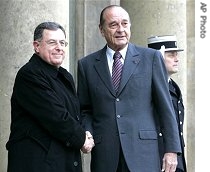2007年VOA标准英语-Donors Gather in Paris To Offer Aid to Lebanon(在线收听)
Paris
25 January 2007
Lebanon is set to reap millions of dollars in aid Thursday, when representatives from some 35 Western and Middle Eastern countries meet for a donors' conference in Paris. From the French capital, Lisa Bryant has more on the meeting, which takes place amid continuing unrest in the Middle Eastern country.
The pledges were pouring in even before Thursday's donor meeting began in Paris. The European Union said the 27-member block will pledge $522 million in assistance and loans to Lebanon. French President Jacques Chirac, who is chairing the donors meeting, said France would offer a $650 million loan to the strife-torn country.
Meeting with reporters at the American Embassy in Paris Wednesday, U.S.
Assistant Secretary for Near Eastern Affairs David Welch said the United
States would also offer a generous assistance package to Lebanon.
"Traditionally, American assistance to Lebanon, if we look back over the last five, six years, has averaged between $30 million and $40 million a year," said David Welch. "You can expect an American pledge tomorrow that will be many multiples of that."
Secretary of State Condoleezza Rice said Wednesday the United States will pledge almost $770 million for Lebanon's reconstruction. Last year, Washington pledged $230 million to help Lebanon's reconstruction after fighting between Israel and the Lebanon-based militia group Hezbollah.
News reports suggest that most of this year's assistance will go to repaying
Lebanon's staggering debt, with only part of the sum going to reconstruction efforts after last summer's war. The international assistance is also designed to shore up the government of Lebanon's embattled prime minister, Fuad Siniora.
 |
| France's President Jacques Chirac (r) with Lebanon's Prime Minister Fuad Siniora in Paris |
Jacques Chirac, before holding a news conference later in the day.
The Lebanese prime minister said the Paris conference and the donations that come out of it will benefit all Lebanese, not just the government.
But while the Siniora government has broad international support, it faces strong opposition at home. The Hezbollah militia, which has been working with other political groups in Lebanon to topple the Siniora government. Hezbollah has offered millions of dollars in assistance to ordinary Lebanese affected by last year's clashes with Israel. Hezbollah also has support from other Lebanese opposition parties, both Muslim and Christian groups, which accuse the prime minister of corruption and criticize him as a pawn of the West.
The opposition to the Siniora government has taken a violent turn. A paralyzing, day-long strike staged by Hezbollah supporters Tuesday left three people dead and scores of others injured. Anti- and pro-government factions clashed again Wednesday in the Lebanese city of Tripoli.
U.S. Assistant Secretary Welch says the Paris conference aims to show support for a government that is working in the best interests of all Lebanese.
"What is important here is that you have a government in Lebanon that is forward focused, that looks to the future," he said. "That wants to help the people of Lebanon build a stronger economic and political basis for their society. And this is what the international community hopes to support - not the negative message by those who were burning tires on the streets today or yesterday, or launching wars last summer. That is not a message or hope or progress for the people of Lebanon.
But some analysts, such as Judith Cahen, say Lebanon needs much more help from the international community than just a donors' conference.
A Middle East specialist at the French Institute for International Affairs in Paris, Cahen says that foreign powers can help Lebanon by offering cash.
But it is already the third Lebanon donor's conference in Paris since 1998 - and another took place in Stockholm last August. While Lebanon is in a catastrophic financial situation, Cahen says, it is not certain that another donors' conference will help Lebanon get out of its economic and political impasse.
Cahen suggests the international community should also facilitate a dialogue among Lebanon's clashing political groups. The main facilitators might include members of the so-called Middle East quartet - the United States, Russia, the European Union, and the United Nations.
For his part, Prime Minister Siniora shows no sign of giving in to the opposition's calls for him to step down. Siniora says his government was democratically elected. Rather, he called for negotiations between Lebanon's quarrelling factions. Only through dialogue, he said, can Lebanon's problems be solved.